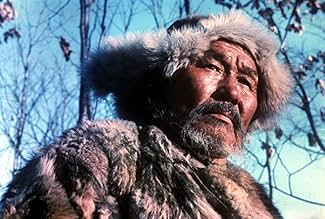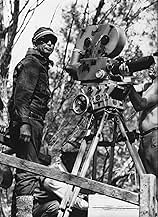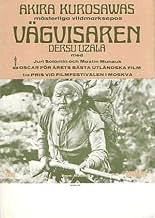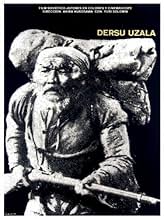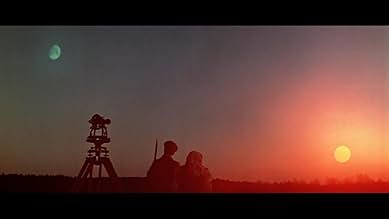AVALIAÇÃO DA IMDb
8,2/10
35 mil
SUA AVALIAÇÃO
O exército russo envia um explorador ao deserto nevado da Sibéria, ele faz amizade com um experiente caçador local.O exército russo envia um explorador ao deserto nevado da Sibéria, ele faz amizade com um experiente caçador local.O exército russo envia um explorador ao deserto nevado da Sibéria, ele faz amizade com um experiente caçador local.
- Direção
- Roteiristas
- Artistas
- Ganhou 1 Oscar
- 8 vitórias e 1 indicação no total
Mikhail Bychkov
- Otryad Arseneva
- (as M. Bychkov)
Vladimir Khrulyov
- Otryad Arseneva
- (as V. Khrulyov)
Stanislav Marin
- Otryad Arseneva
- (as S. Marin)
Igor Sykhra
- Otryad Arseneva
- (as I. Sykhra)
Vladimir Sergiyakov
- Otryad Arseneva
- (as V. Sergiyakov)
Yanis Yakobsons
- Otryad Arseneva
- (as Ya. Yakobsons)
Vladimir Khlestov
- Otryad Arseneva
- (as V. Khlestov)
Vladimir Sverba
- Otryad Arseneva
- (as V. Sverba)
Vladimir Kremena
- Turtygin
- (as V. Kremena)
Aleksandr Pyatkov
- Olenev
- (as A. Pyatkov)
- Direção
- Roteiristas
- Elenco e equipe completos
- Produção, bilheteria e muito mais no IMDbPro
Avaliações em destaque
Akira Kurosawa was a masterful director and powerful storyteller, Dersu has always been my favourite of his films. It was also the first I saw - on Christmas Day afternoon 1978 on UK BBC2 - would that they were as adventurous nowadays! Since then of course I've seen all of his films from Stray Dog on, Rashomon and Ran being especial favourites, but I keep on coming back to watch this one, ostensibly the simplest tale Kurosawa ever filmed.
The understanding and bonding that develops between the two men Arseniev and Dersu is wonderful to see, and over two hours holds your attention with expertly observed minutiae of character and scenic interplay. The last ten minutes cover a lot of ground (no pun intended) but it's all so logical and sad that I always need to see the end credits to recover.
So many marvellous scenes: the tiger in the forest in the morning; the phlegmatic reclusive old Chinaman; the raft; wispy blue shaded smoke from night-fires; the conclusion of course; the view of those two great men, the Moon and the Sun in the same shot. Not everyone would like Dersu, their most likely comments being "boring" - but how wrong they are they'll never know!
A film not fit to lick Dersu Uzala's metaphorical boots (or even Plan 9 from Outer Space's for that matter), Blazing Saddles was filmed the same year in America and a generation on still gets more praise than this poetic masterpiece!
The understanding and bonding that develops between the two men Arseniev and Dersu is wonderful to see, and over two hours holds your attention with expertly observed minutiae of character and scenic interplay. The last ten minutes cover a lot of ground (no pun intended) but it's all so logical and sad that I always need to see the end credits to recover.
So many marvellous scenes: the tiger in the forest in the morning; the phlegmatic reclusive old Chinaman; the raft; wispy blue shaded smoke from night-fires; the conclusion of course; the view of those two great men, the Moon and the Sun in the same shot. Not everyone would like Dersu, their most likely comments being "boring" - but how wrong they are they'll never know!
A film not fit to lick Dersu Uzala's metaphorical boots (or even Plan 9 from Outer Space's for that matter), Blazing Saddles was filmed the same year in America and a generation on still gets more praise than this poetic masterpiece!
It's 1902. Russian army explorer Captain Arseniev leads an expedition into the Siberian wilderness. They encounter local native hunter Dersu Uzala and recruit him as their guide.
It's a Soviet film made by the legendary Japanese filmmaker Akira Kurosawa. I'm not sure how that happened. Quite frankly, I watched the first hour without knowing about Kurosawa and was going to write that this is the best filmmaking out of the Soviet Union. The movie is over two hours and it does need to find a road map for their journey. I'm not saying that it lacks direction. It has an emotional direction. It's about the two men's relationship. I would like for more scenes of the two of them alone. They should have more heart to heart dialogue. Dersu is a great character. For example, I love the grass shelter and the two men are alone in survival mode. I'm also surprised by the tiger. The second half holds some interesting surprises. This is an interesting page in a legend's work. It won an Oscar.
It's a Soviet film made by the legendary Japanese filmmaker Akira Kurosawa. I'm not sure how that happened. Quite frankly, I watched the first hour without knowing about Kurosawa and was going to write that this is the best filmmaking out of the Soviet Union. The movie is over two hours and it does need to find a road map for their journey. I'm not saying that it lacks direction. It has an emotional direction. It's about the two men's relationship. I would like for more scenes of the two of them alone. They should have more heart to heart dialogue. Dersu is a great character. For example, I love the grass shelter and the two men are alone in survival mode. I'm also surprised by the tiger. The second half holds some interesting surprises. This is an interesting page in a legend's work. It won an Oscar.
10Anig-2
Dersu Uzala is slow, serene, beautiful, but nevertheless gripping. It tells of the friendship between a nomadic Siberian native and a Russian army explorer, and how the former is able to help the latter and his team to negotiate the many obstacles presented by the Siberian wilderness. We see how traditional survival methods and intrinsic common sense can help the more urbanised army men to cope with the extremes of climate and geography. Eventually the nomad is persuaded to join the general on his trip back to a town. His ignorance of urban life is apparent, but interesting nevertheless, as we do not imagine such people nor meet them in everyday life today. Kurosawa is on top form here, letting the camera take in the vastness of Siberia, and still allowing the viewers to observe the characters closely. The story is interesting too, with a sadly ironic ending (won't say any more!). I think everybody should watch this film, because everybody will have something to learn from it.
I own many of Akira Kurosawa's films. I have Ran, Throne of blood, Seven Samarai, Roshomon, Dreams, Hidden Fortress, Jojimbo, Snajuro, Red Beard, and even "Kurosawa" the documentary. I guess you can say that I like his work. The "Kurosawa" documentary narrated by Sam Shepard and produced by thirteen / WNET I recommend for anyone at all interested in Kurosawa's films as it will really wet your appetite.
Of all of his films, Dersu Uzala is my favorite. It is also one of my favorite films by anybody. It was done shortly after Akira had went through a very dark time in his life and had attempted suicide. It was his first film afterwards and the content of the film appears to reflect more than a little of his mindset at the time. Dersu Uazla is both a feel good film and also a sad film. It touches the way that people as they grow older have a more and more difficult time adapting to life as it changes and has its affect on them. The end of the film can certainly show light on the inhumanity that appears to be growing more prevalent in our society. But, I think what you remember from the film is the love between two individuals, and that is what feels good.
Many of Kurosawa's films have a great deal of spectacle, and he is perhaps known best for his Samarai films. There is none of that in this movie. Dersu Uzala is a statement by Akira of life. Akira was fighting to keep making films and was not having an easy time of it. If Akira Kurosawa could not make films, he could not feel that he was living. As a result, he attempted suicide. He survived to make this film plus many others that we all enjoy today. Dersu Uzala may be the most important of his films and the one that shows the great director's true personality. Just perhaps, it shows more about humanity than any of his other films. Again, it is my favorite.
Of all of his films, Dersu Uzala is my favorite. It is also one of my favorite films by anybody. It was done shortly after Akira had went through a very dark time in his life and had attempted suicide. It was his first film afterwards and the content of the film appears to reflect more than a little of his mindset at the time. Dersu Uazla is both a feel good film and also a sad film. It touches the way that people as they grow older have a more and more difficult time adapting to life as it changes and has its affect on them. The end of the film can certainly show light on the inhumanity that appears to be growing more prevalent in our society. But, I think what you remember from the film is the love between two individuals, and that is what feels good.
Many of Kurosawa's films have a great deal of spectacle, and he is perhaps known best for his Samarai films. There is none of that in this movie. Dersu Uzala is a statement by Akira of life. Akira was fighting to keep making films and was not having an easy time of it. If Akira Kurosawa could not make films, he could not feel that he was living. As a result, he attempted suicide. He survived to make this film plus many others that we all enjoy today. Dersu Uzala may be the most important of his films and the one that shows the great director's true personality. Just perhaps, it shows more about humanity than any of his other films. Again, it is my favorite.
This 1975 joint Japanese-Russian film is a celebration of simple virtues, friendship, loyalty, love, and respect for nature. Based on the journals of the Tsarist explorer and surveyor, Captain Vladimir Arseniev, it is the story of the relationship between Captain Arseniev and an Asiatic hunter of the Goldi tribe named Dersu Uzala. With a love and understanding of the forest that is extraordinary, Dersu guides the Captain through several deadly encounters. He saves the Captain's life by building a shelter out of reeds during a ferocious wind storm. Maksim's performance as Dersu, the ancient woodsman, is very "Yoda-like": wonderous, dignified, and very natural.
The friendship between the two main characters grows over many years and several expeditions in the wild. Their relationship is beautifully developed and moves to an inevitable climax when Dersu and the Captain move back to the Captain's home in the city.
There is in this film a sense of the beauty, tranquility, and timelessness of nature. It takes place at a time in the early part of the last century when people had closer ties with nature and felt a kinship with animals, plants, and the elements. Dersu endearingly refers to all elements of nature including the river, the wind, the trees, and the animals as "men". As the English writer, Hugh Trevor-Roper said of Shakespeare so it is true of Dersu, "He sees mankind almost as part of nature, sometimes basking in a delightful, smiling Nature; sometimes caught up in a fierce, cruel, inexorable, insatiable Nature".
I was totally absorbed in this film and in its regard for the essential goodness of man and the beauty of the natural world. Dersu Uzala is a great film from one of the all-time masters.
The friendship between the two main characters grows over many years and several expeditions in the wild. Their relationship is beautifully developed and moves to an inevitable climax when Dersu and the Captain move back to the Captain's home in the city.
There is in this film a sense of the beauty, tranquility, and timelessness of nature. It takes place at a time in the early part of the last century when people had closer ties with nature and felt a kinship with animals, plants, and the elements. Dersu endearingly refers to all elements of nature including the river, the wind, the trees, and the animals as "men". As the English writer, Hugh Trevor-Roper said of Shakespeare so it is true of Dersu, "He sees mankind almost as part of nature, sometimes basking in a delightful, smiling Nature; sometimes caught up in a fierce, cruel, inexorable, insatiable Nature".
I was totally absorbed in this film and in its regard for the essential goodness of man and the beauty of the natural world. Dersu Uzala is a great film from one of the all-time masters.
Você sabia?
- CuriosidadesAkira Kurosawa had hoped to make this film as early as in the 1950s, but he had trouble adapting the story to a Japanese setting, never thinking that one day he would actually be able to film it on location in Russia, and with Russian actors.
- Erros de gravaçãoWhen Dersu and Arsenev are looking at the 3/4 moon and the setting sun, the moon is in the wrong phase to appear in the sky at the same time as the sun.
- Citações
Dersu Uzala: How can people live in a box?
- ConexõesFeatured in For the Love of Movies: The Story of American Film Criticism (2009)
Principais escolhas
Faça login para avaliar e ver a lista de recomendações personalizadas
- How long is Dersu Uzala?Fornecido pela Alexa
Detalhes
- Data de lançamento
- Países de origem
- Central de atendimento oficial
- Idiomas
- Também conhecido como
- Uzala, der Kirgise
- Locações de filme
- Empresas de produção
- Consulte mais créditos da empresa na IMDbPro
Bilheteria
- Orçamento
- US$ 4.000.000 (estimativa)
- Faturamento bruto mundial
- US$ 14.480
- Tempo de duração2 horas 22 minutos
- Cor
- Proporção
- 2.20 : 1
Contribua para esta página
Sugerir uma alteração ou adicionar conteúdo ausente

Principal brecha
By what name was Dersu Uzala (1975) officially released in Canada in English?
Responda

